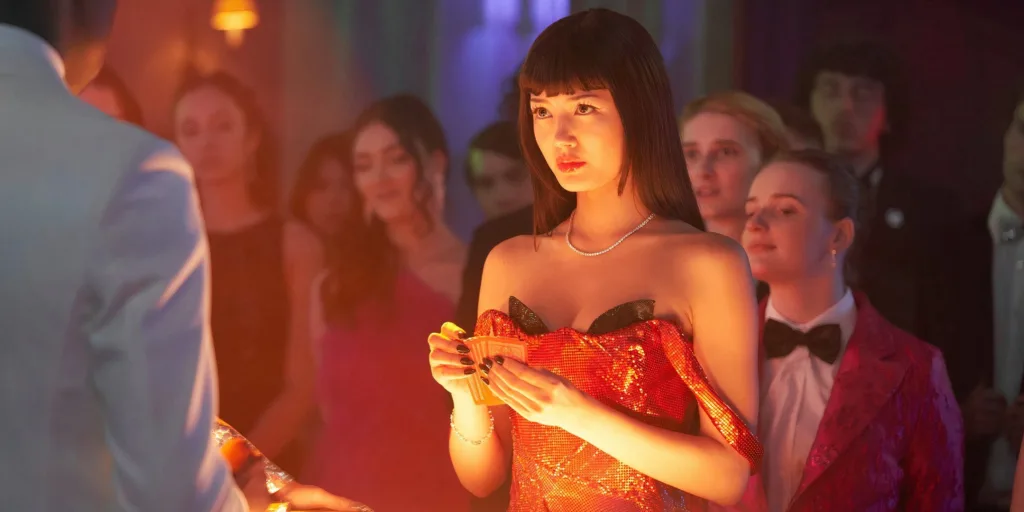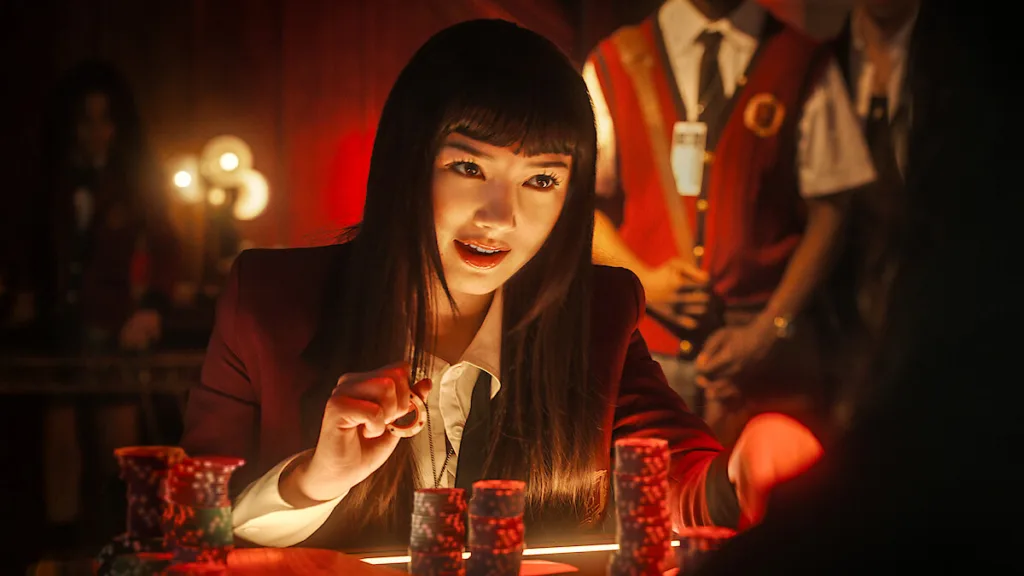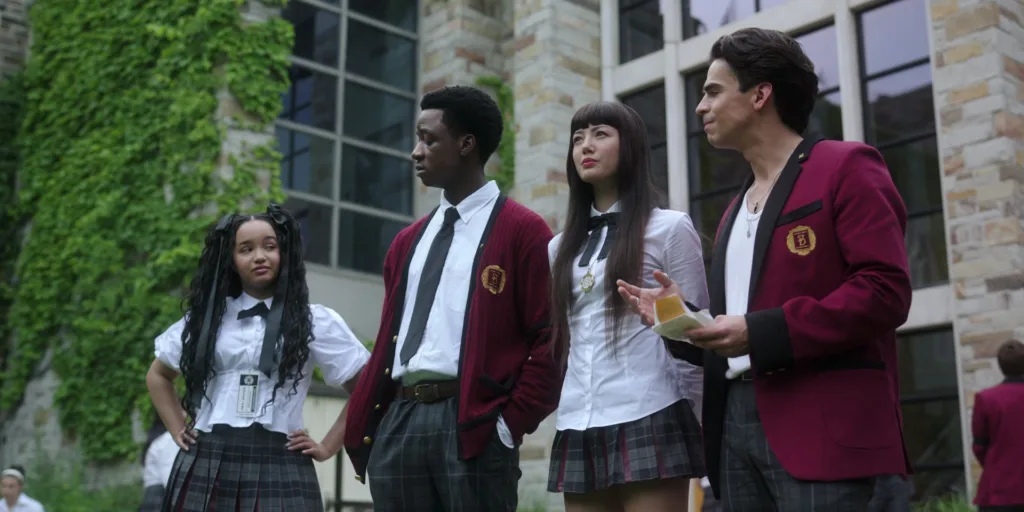In the ever-expanding atlas of streaming content, where narratives are increasingly globalized and familiar intellectual properties are frequently re-engineered for new audiences, “Bet” arrives as a glossy, high-stakes drama. The series ushers viewers into the rarified air of St. Dominic’s Prep, an institution less concerned with pedagogy and more with poker faces.
Here, adolescent ambition and parental fortunes collide, for the school’s entire pecking order, from the revered elite to the subjugated “house pets,” is determined not by academic merit but by the brutal calculus of high-stakes gambling.
Into this meticulously stratified ecosystem steps Yumeko, a transfer student whose disarming smile and seemingly insatiable appetite for risk conceal a far more calculated agenda: a deeply personal quest for retribution. Her arrival promises to unravel the established order, setting the stage for a series of intense psychological duels and precarious alliances, where every wager carries the weight of ruin or reign.
The Gilded Gauntlet: Inside St. Dominic’s Darwinian Design
St. Dominic’s Prep operates less as an institution of learning and more as a lavishly appointed laboratory for a brutal social experiment, a reflection, perhaps, of late-stage capitalism’s more theatrical anxieties. Forget traditional subjects; the core curriculum here is chance, the syllabus written by the daily fluctuations of fortune.
Students, armed with substantial stipends from their affluent, unseen parents, navigate a treacherous social ladder where academic or artistic talents are worthless currency. Instead, status is coldly calculated, displayed through rankings determined solely by gambling winnings. This forms a rigid hierarchy, a stark pyramid of power built upon the disposable income of the global elite.
The school’s most striking feature, and its most direct commentary on societal stratification, is the chilling “house pet” system. Those unfortunate students whose debts eclipse their funds are stripped of their autonomy, becoming literal servants to their creditors. This codified subjugation, where human beings are reduced to chattel, is depicted with a frankness that underscores the ruthlessness underpinning St. Dominic’s polished facade. It’s a disturbing, if unsubtle, metaphor for the consequences of economic disparity, demonstrating the casual cruelty that can flourish within systems of absolute power imbalance.
Presiding over this insular world, and meticulously crafting its often-sadistic rules of play, is the Student Council. This cabal of top-ranking gamblers, led by the formidable Kira and her frequently silent, observant sister Riri, functions as a de facto oligarchy. They are the beneficiaries and enforcers of St. Dominic’s merciless order, their authority absolute within the school’s walls, a chilling depiction of how power, once attained, often works to perpetuate the conditions of its own dominance.
The Players and the Played: Character Constellations in “Bet”
At the heart of St. Dominic’s whirlwind of wagers is Yumeko, portrayed by Miku Martineau with a compelling screen presence that captures both an unnerving intensity and a calculated charm. Yumeko arrives not merely as a new student but as a deliberate narrative disruptor, her wide-eyed eagerness and occasionally outlandish fashion choices a clever veneer for a mind honed by compulsive gambling and a spirit driven by a clandestine mission for vengeance tied to her parents’ demise.
Her immediate, fearless engagement with the school’s perilous games sends ripples of unease through the established order, challenging the very foundations of the student council’s authority. Martineau navigates Yumeko’s layered personality, showcasing a young woman who is as adept at feigning innocence as she is at psychological warfare.
The reigning power, the Student Council, is embodied by its president, Kira (Clara Alexandrova), a figure of icy control and palpable viciousness. She, alongside her mostly nonverbal but equally imposing sister Riri, and other eccentric council members like the eye-patch-wearing Dori, represents the entrenched hierarchy, their dominance built on fear and financial might. Their reaction to Yumeko is one of affronted disbelief, swiftly escalating to open hostility as her audacious plays threaten their carefully constructed dominion.
Surrounding these central figures is a constellation of students whose allegiances and perspectives offer a more varied view of life within St. Dominic’s. Ryan Adebayo, a British Nigerian student played by Ayo Solanke, quickly becomes entangled with Yumeko, his initial infatuation drawing him into her high-risk ventures, often with perilous consequences.
In contrast, Hunter Cardinal’s Michael stands as a moral objector, a rare student who actively refuses to participate in the gambling madness, urging Yumeko towards a different path. Eve Edwards as Mary, a council member demoted to the ignominy of a “house pet,” charts a more complex trajectory from antagonist to a conflicted, potential ally. Adding another dimension is Chad, a character seemingly crafted for this adaptation, a bookish tech whiz who becomes a reluctant bookie and a key confidant in Yumeko’s investigation.
The interplay between these individuals is frequently fraught. Yumeko’s methods often involve a calculated manipulation of those around her, particularly exploiting Ryan’s evident feelings. Friendships are forged in the crucible of shared risk but remain perpetually fragile. The series also introduces romantic subplots, such as Dori’s rather unsettling and one-sided pursuit of Chad, which, while perhaps aiming for character depth, occasionally veers into uncomfortable territory, highlighting how even attempts at connection are warped by the school’s oppressive atmosphere. These relationships test loyalty and reveal the strains of navigating an environment where trust is a dangerous commodity.
High-Stakes Pedagogy: The Games as Narrative Engines in “Bet”
The contests within St. Dominic’s Prep are far removed from quaint extracurricular activities; they are the very pulse of the institution, a series of increasingly elaborate and perilous spectacles. The initial card game of “Skirmish” soon gives way to more complex and psychologically invasive challenges: “House Wars” that pit factions against each other, a disturbing “House Pet Hunt” that underscores the dehumanization inherent in the school’s system, a game leveraging physiological responses as players expose deeply personal secrets, and even a campus-wide, high-octane version of capture-the-flag.
With each new game, the wagers escalate, moving beyond mere monetary value to encompass reputation, freedom, and the very real prospect of social annihilation, reflecting a trend in contemporary television for high-concept, visceral challenges.
These games are not simply interludes of action; they are the primary narrative devices through which “Bet” explores its central concerns and develops its characters. Each carefully orchestrated contest serves as a crucible, revealing the stark ambition, hidden vulnerabilities, or surprising ethical lines of its participants.
We witness Yumeko’s peculiar insistence on fairness even as she employs manipulation, and the profound viciousness of students willing to metaphorically (and perhaps, in the school’s context, almost literally) “kill off” their classmates to avoid the fate of a house pet. The outcomes of these matches directly recalibrate the school’s delicate power balances, propelling the overarching plot forward as allegiances shift and new vendettas are forged.
Visually, the gambling sequences are rendered with a flair for the dramatic, aiming for cinematic suspense through sharp editing, strategic lighting, and a score designed to heighten tension. The psychological warfare between players is often the main event, as strategies – or the tell-tale signs of cheating – become the focus. While the thrill of these high-stakes encounters is palpable, the intricate and sometimes rapidly explained rules of engagement can occasionally leave the viewer scrambling to keep pace, a moment where the desire for spectacular complexity might momentarily outstrip narrative clarity.
Decoding the Wager: Thematic Currents Beneath the Surface of “Bet”
Beyond the immediate thrill of its high-stakes games, “Bet” lays bare a cynical ecosystem where power, wealth, and corruption are inextricably linked. St. Dominic’s Prep serves as a gaudy allegory for societies fixated on status, illustrating the extreme lengths individuals will traverse to secure their standing or merely to evade the crushing weight of subjugation. Greed is not just a character flaw here; it is an institutionalized virtue, the very fuel that keeps the school’s perverse machinery churning, offering a rather pointed, if sensationalized, commentary on unchecked ambition.
Central to the narrative is Yumeko’s personal vendetta, a quest for retribution that adds a layer of intrigue to her gambling obsession. Her actions raise persistent questions about the nature of justice within a patently unjust system. Is she a righteous avenger, a necessary disruptor of a corrupt order, or simply another player adept at manipulating the game for her own ends? The series appears to revel in this ambiguity, using her drive to explore the murky territory of defying established, if flawed, authority.
The pressure-cooker environment of St. Dominic’s also forces a constant negotiation of identity. Yumeko’s elaborately constructed facade of bubbly naivete, masking a calculating mind and deep-seated trauma, speaks to a broader exploration of performed personas versus authentic selves. Characters continually grapple with past hurts and the emotional toll of survival in a place where vulnerability is a liability, reflecting a very contemporary concern about the masks people wear in high-pressure, performative environments.
This intense setting effectively magnifies typical adolescent anxieties: bullying morphs into outright persecution, peer pressure dictates devastating choices, and the pursuit of popularity becomes a life-altering gamble, turning the school into a heightened battleground for social survival.
Polished Veneer, Calculated Chaos: The Craft of “Bet”
“Bet” presents a visually arresting world, embracing a “flashy” and self-consciously “stylish” aesthetic where gambling scenes are often rendered with cinematic grandeur. The production leans into a heightened reality, employing specific lighting choices, dynamic camera angles, and, notably, flourishes that echo its manga and anime lineage. These include surreal cutaways, Dutch angles for dramatic emphasis, slow-motion reveals during critical game moments, and exaggerated emotional reactions from its characters.
Such choices aim to inject a distinctive energy, yet their success is variable; at times they effectively amplify the tension, while at others they risk feeling “cartoonish” or, as some might observe, like “awkward cosplay” when transplanted into a live-action Western setting. Costume and makeup choices further underscore this heightened world, ranging from sharp, elite school attire to Yumeko’s sometimes incongruous micro-mini skirt, all contributing to the series’ specific, if occasionally divisive, visual signature.
The auditory landscape of “Bet” plays a significant role in cultivating its atmosphere of suspense. The background score is frequently employed to ratchet up tension during the gambling set-pieces, effectively underscoring the psychological drama unfolding. Overall, the sound design works in concert with the visuals to immerse the viewer in the school’s high-pressure environment.
Performances are central to navigating this stylized terrain. Miku Martineau as Yumeko is a standout, consistently praised for her commanding screen presence, adeptly conveying her character’s enigmatic charm, underlying danger, and moments of genuine emotional depth. The supporting cast elicits a more mixed response; some actors are commended for being “up for it” and delivering engaging portrayals, with Clara Alexandrova’s Kira often cited for her intensity. However, other performances occasionally veer into the “overdone” or “hammy,” sometimes appearing to mimic exaggerated anime expressions rather than grounding the character in a more naturalistic emotional state, a pitfall when translating such heightened source material.
The series generally maintains a brisk tempo, with “swift” and “riveting” editing that keeps the narrative moving. Episodes, typically under 40 minutes, are structured for “breezy” consumption, a pacing characteristic of many contemporary streaming offerings designed to hold attention across multiple installments. This energetic delivery ensures that the show rarely feels slow, even if the substance of its story is sometimes outpaced by its stylistic verve.
The Unfolding Hand: “Bet’s” Narrative Trajectory and Viewer Connection
“Bet” structures its season around the gradual unfurling of Yumeko’s mysterious past and the truth behind her parents’ demise, with clues sprinkled throughout leading to a climactic reveal. While this provides a central thread, the effectiveness of these revelations, particularly in the finale, may vary for viewers, with some finding them less shocking than anticipated.

The episodic plot can, at times, fall into a pattern of successive gambling confrontations, which, while delivering spectacle, occasionally lend a sense of repetition to the narrative progression. Viewer engagement hinges significantly on the allure of its twists, the inherent tension of its high-stakes games, and the unpredictable nature of its protagonist, Yumeko.
These elements often succeed in maintaining interest. However, certain aspects might prove challenging for a broader audience; tonal inconsistencies can be jarring, and the persistent “over-the-top” stylistic choices may not resonate universally. Some subplots, particularly those feeling less organically integrated, also risk diluting focus rather than enriching the core story.
Ultimately, “Bet” carves out a specific niche for itself. It is likely to appeal most to viewers who appreciate high school dramas with a decidedly dark inflection, those drawn to psychological gamesmanship, and audiences who enjoy visually stylized, genre-bending narratives. The series navigates a precarious balance between its human drama and its more exaggerated, almost theatrical sensibilities, positioning itself as a distinctive offering that commits to its heightened reality, for better or worse.
Full Credits
Director: Simon Barry, Jacquie Gould, Craig Wallace, Joyce Wong
Writers: Simon Barry, Homura Kawamoto, Tabia Lau, Tôru Naomura, Amanda Fahey, Laura Good, Kurt Mungal, Ashley Park, Chris Roberts
Producers: Kerry Appleyard, David Fortier, Nick Nantell, Ivan Schneeberg
Executive Producers: Simon Barry, Jeff King, Jon Rutherford
Cast: Miku Martineau, Eve Edwards, Aviva Mongillo, Anwen O’Driscoll, Ayo Solanke, Alex Hook, Clara Alexandrova, Dorian Giordano, Laura Afelskie, Hunter Cardinal, Rami Khan, Ryan Sutherland, Piyal Sarker, Emma Elle Paterson, Emily Shelton, Jay Yoo, Christine Okuda Hara, Ken Pham, Erin Agostino, Shane Daly, James Burke, Julian Young, Isaac Kragten, Laura de Carteret, Alexandra Chaves, Ang Kiriakos, Kiera Osborne, Danie Roman
Director of Photography: David A. Makin, James Klopko
Editors: Aren Hansen, Simone Smith
Composer: Kalaisan Kalaichelvan
The Review
Bet
"Bet" presents a visually ambitious, if uneven, foray into a hyper-stylized scholastic battleground, anchored by Miku Martineau’s commanding lead performance. Its exploration of power and vengeance through high-stakes games is often intriguing. While its bold stylistic choices and narrative execution sometimes falter, creating a jarring experience, its commitment to a dark, distinctive premise offers a compelling, if acquired, taste for viewers seeking unconventional genre television that reflects certain daring trends in streaming content.
PROS
- Miku Martineau's captivating lead performance as Yumeko.
- Engaging and audacious core premise of a high-stakes gambling school.
- Visually stylish moments, particularly in the depiction of games.
- Thought-provoking exploration of power, vengeance, and social hierarchy.
- Energetic pacing and a distinctive, bold vision.
CONS
- Stylistic choices can be jarring and inconsistently executed.
- Some supporting performances feel uneven or overly exaggerated.
- Narrative structure can become repetitive with game-after-game format.
- Tonal shifts and underdeveloped subplots may detract from engagement.
- Clarity of game rules can sometimes be insufficient.




















































